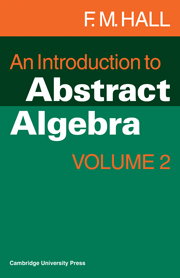Summary
Definition of a ring
We have seen that in a group we have a set together with an operation which obeys certain rules analogous to the rules of ordinary multiplication, or addition. It is immaterial whether we call this operation addition or multiplication, except that it is conventional to use the product notation in the general case, reserving the sum notation for Abelian groups.
It often happens that we have a set which contains two different operations, and that these operations are linked in some way. The obvious example is in the set of real numbers where we have addition and multiplication, which are linked by the Distributive Law. Subtraction arises from addition (by the introduction of negatives) and division from multiplication (by the introduction of inverses), but the Distributive Law forms the only real connection between sum and product, and distinguishes between them since the dual Distributive Law (that x + yz = (x + y) (x + z), obtained by interchanging sum and product) is not satisfied.
The set of reals is by no means the only set containing two operations. Other examples are given below.
Example 1. The set of integers admits of addition (and subtraction) and multiplication (but not division).
Example 2. The set of polynomials in x (of any degree, with real coefficients) admits of addition and multiplication, including subtraction but not division in general, though it may do so in special cases.
Information
- Type
- Chapter
- Information
- An Introduction to Abstract Algebra , pp. 56 - 91Publisher: Cambridge University PressPrint publication year: 1969
